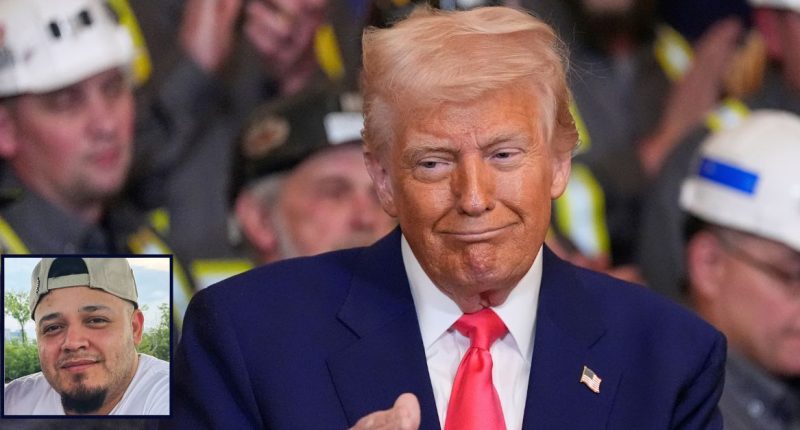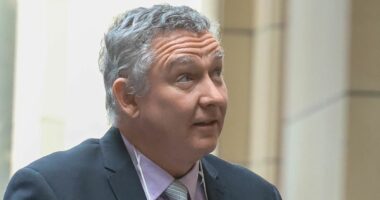Share this @internewscast.com
Main: President Donald Trump speaking during an event focused on energy production in the White House’s East Room on Tuesday, April 8, 2025, in Washington (AP Photo/Alex Brandon). Inset: Kilmar Abrego Abrego Garcia in an undated photo (CASA).
On Wednesday, the federal judge in Maryland, presiding over Kilmar Abrego Garcia’s case, agreed to a request from several media outlets to disclose a collection of documents previously withheld from public view. In March, the Trump administration reportedly “wrongfully” deported Abrego Garcia to the infamous CECOT work prison in El Salvador without following due process.
U.S. District Judge Paula Xinis from Maryland has made public six documents, with some requiring partial redactions, along with a transcript from an April 30, 2025, hearing, which will also be partially redacted.
In the five-page order, Xinis said she entertained the motion to intervene in the case because it is “well-settled” that the members of the press have a constitutional right to challenge the sealing of court filings.
“The Press Movants rightly contend that, at common law, the public enjoys a presumptive right to access court records, overcome only when outweighed by competing interests,” the judge wrote. “The First Amendment, too, accords the public access, unless there has been a showing of ‘compelling governmental interest, and only if the denial is narrowly tailored to serve that interest.””
The intervenor filing came on behalf of more than 20 news organizations, including The Associated Press, ABC, CBS, The New York Times, The Washington Post, and Reuters, among others.
She added that the right of public access to court records is “critical” to promoting “trustworthiness of the judicial process, to curb judicial abuses, and to provide the public with a more complete understanding of the judicial system, including a better perception of fairness.”
The government opposed the request from the press, first arguing that all the filings constituted “discovery materials” that are typically not opened to the public, and second, claiming that “no good can come to the case” by granting the pubic access to the documents.
Xinis, who has butted heads with the government for allegedly flouting several of her previous orders, did not agree with either of the administration’s purported reasons, writing that “Neither withstand scrutiny.”
The judge noted that the only “discovery” materials at issue had already been filed publicly by the government and only sealed after a follow-up request to do so the following day.
“Upon consideration of the Press Movants’ position, the Court recognizes that judges simply ‘do not have the power, even were we of the mind to use it if we had, to make what has thus become public private again,’” Xinis wrote. “Thus, the Court will unseal those documents.”
Three of the unsealed documents pertain to a joint request for a discovery conference from April and a subsequent request from the government for a stay in the discovery process that the plaintiffs opposed. The joint filing and the government’s request for a stay were ordered unsealed in their entirety, while the plaintiff’s response opposing the stay will be partially redacted because it includes information “potentially implicated” by the government’s state secrets privilege claim, which remains outstanding.
The judge will also unseal a redacted transcript of an ex parte hearing from April 30, concerning the administration’s “outstanding assertion of the state secrets privilege and information marked ‘classified.’”
Abrego Garcia’s case has garnered international attention, quickly becoming one of the most high-profile and combative lawsuits amid the blizzard of legal challenges filed against Trump and his administration since he retook office in January. The government has conceded in numerous filings that his removal to El Salvador was an “administrative error,” but has steadfastly insisted that he is a member of MS-13 and refused to cooperate with multiple court orders demanding he be brought back to the country.
Xinis has previously upbraided the administration for ignoring court orders to produce information regarding Abrego Garcia’s detention and the steps being taken to facilitate his return and for allegedly “mischaracterizing” the Supreme Court’s April order.
Notably, the government has proffered little, if any, evidence that Abrego Garcia was a gang member. He has no criminal record in the U.S. or El Salvador and has submitted sworn statements that he was fleeing El Salvador due to gang violence. He has never been charged or convicted of a crime in the U.S. or El Salvador and the government has conceded on numerous occasions that he was removed to the Salvadoran prison in “error.”















